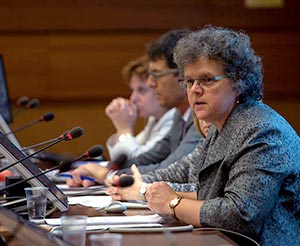
Elder abuse is a global crisis that is growing. By the year 2025, there will be 1.2 billion people in the world over the age of 60. While country-specific data varies, it is clear older adults all across the globe experience physical, sexual, emotional and financial abuse. In the U.S., recent studies suggest at least 10% of older adults experience abuse in some form.
As U.S. Assistant Secretary for Aging, I have the opportunity and responsibility to highlight this crisis domestically and internationally. On the world stage, it is important the U.S. lead, participate in and learn from dialogue with other countries and nongovernmental organizations. Together, as a community of nations, we need to educate people around the world to the realities of this abuse. We need to collaborate as we identify effective means of prevention and intervention. And, we must prioritize our commitment to seek out and listen to the older adults who become victims of abuse. The survivors must guide our work. Unfortunately, we are all behind. On a universal basis we lack adequate data, we have insufficient investment in research, and incomplete information about best practices to support the security and safety of older citizens.
I spent the past week in Geneva assessing these challenges; searching for collective opportunity. While there is much work to be done, we are beginning to make significant progress in creating a cohesive framework for how to address this critical issue, both internationally and at home.
Last Friday, the U.S. hosted a workshop at the United Nations Human Rights Council (HRC) meeting on Elder Abuse and Violence Against Older Women. The Honorable Keith Harper, U.S. Ambassador to the HRC, opened the event and I had the honor of moderating. We were joined on the panel by four experts on elder abuse and the rights of older adults, including Ms. Rosa Kornfeld-Matte, the HRC’s Independent Expert on the Full Enjoyment of the Human Rights of All Older Persons. This was the first time a panel on elder abuse was convened at the HRC. The fact the U.S. hosted the panel amplified its historic significance. Moving forward, I hope to partner with colleagues from the U.S. Mission Geneva and the U.S. Department of State to identify ways existing mandates can be better used as levers to help address problems of elder abuse worldwide.
Elder abuse is also a public health crisis. The U.S. Department of Health and Human Services has strong relationships with the World Health Organization, which is also based in Geneva. I want to extend my thanks to Dr. John Beard, Director of the Office on Ageing and Life Course Program for his participation in the HRC panel. Victims of elder abuse experience a 300% increase in mortality and morbidity. Our partners in the world of public health are interested in ongoing dialogue about the ways in which we can highlight and draw connections between aging, health and abuse.
As last week demonstrates, with the support of the U.S. Mission, we can engage on dual tracks with HRC and WHO as we identify additional opportunities to learn more about how to address elder abuse.
I am proud to continue to work with advocates in U.S. and abroad who share my passion about combatting abuse. I consider elder abuse to be an outrage against humanity. Abuse steals our goals of maintaining our dignity and independence as we grow old. We must tackle the complex problems of abuse at every opportunity. We have friends around the world who stand with us in this fight.

